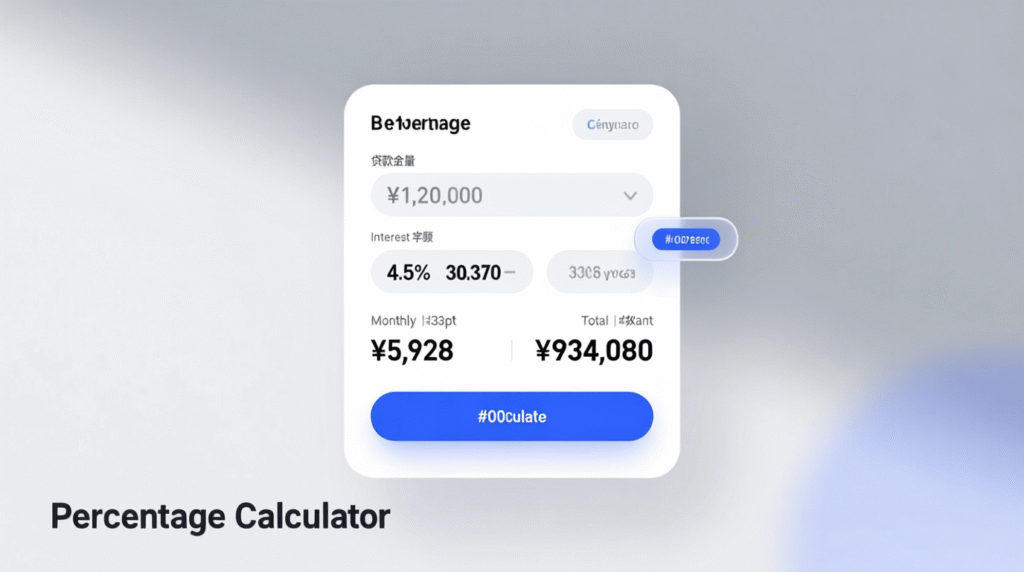Advanced Percentage Calculator
X% of Y
Calculate what is X percent of Y value
X is what % of Y
Calculate what percentage X is of Y
Percentage Change
Calculate percentage increase/decrease from X to Y
Calculation History
Percentage Calculation FAQs
To calculate a discount, use the "X% of Y" calculator. Enter the discount percentage as X and the original price as Y. The result will show the discount amount. Subtract this from the original price to get the sale price.
Use the "X% of Y" calculator. Enter the tip percentage (usually 15-20%) as X and the bill amount as Y. The result will be the tip amount to add to your bill.
Use the "Percentage Change" calculator. Enter the original value as "From" and the new value as "To". The calculator will show the percentage increase (or decrease if the value went down).
Use the "X% of Y" calculator. Enter the tax rate as X and the purchase amount as Y. The result will be the tax amount to add to your purchase.
Use the "X is what % of Y" calculator. Enter the part value as X and the total value as Y. The result will show what percentage the part is of the total.
Percentage Calculator: The Dead-Simple Way to Nail Percentages (Without the Headache)
Ever stood in a shop, staring at a “30% off” sign, phone in hand, trying to work out if you’re actually saving money—or just getting played?
Yeah.
Me too.
Or maybe you’re splitting a bill, calculating a tip, or figuring out how much your savings will grow with 4.2% interest.
Whatever it is, percentages shouldn’t feel like algebra.
That’s where a percentage calculator saves your sanity.
No fluff. No formulas. Just clear answers, fast.
Why Bother with a Percentage Calculator?
Because guessing costs you—literally.
Whether you’re:
- Budgeting monthly bills
- Working out VAT (yep, still 20% in the UK)
- Comparing loan interest
- Figuring out that “15% deposit” on a car
- Checking your pay rise (“Is 3% really worth celebrating?”)
…a percentage calculator cuts through the fog.
And no, you don’t need to remember if it’s “part over whole times 100” or whatever your GCSE maths teacher mumbled.
How to Use a Percentage Calculator (Like a Normal Human)

Here’s the cheat sheet:
✅ To find X% of Y
→ Enter the percentage (e.g., 20) and the number (e.g., £250)
→ Get your answer (£50)
✅ To find what % one number is of another
→ “What’s 40 as a % of 200?” → Answer: 20%
✅ To calculate % increase or decrease
→ Went from £80 to £100? That’s a 25% increase
→ Dropped from £120 to £90? That’s a 25% decrease
All of this takes 10 seconds.
And saves you from looking clueless in front of your mates—or worse, your bank manager.
Real example: I was comparing two savings accounts.
One offered “£50 bonus”, the other “3% AER”.
Used a percentage calculator—turns out the 3% earned me £90 in Year 1.
Chose the right one. Kept the extra £40.
Small win? Yeah. But those add up.
Common UK Scenarios Where This Actually Matters
- VAT calculations: Is that £120 price including VAT or not?
- Council tax discounts: 25% off if you live alone—what’s your actual bill?
- Student loan repayments: You pay 9% over £27,295 (Plan 2)—how much is that really?
- Energy bill caps: “Your usage is 15% above average”—should you panic?
- Salary negotiations: “We can offer a 2.8% raise.” Cool… but what’s that in actual quid?
A percentage calculator turns vague promises into real numbers.
Pro Tips Most People Miss
- Percentages are reversible: 10% of 50 = 50% of 10. Mind = blown? Use it.
- Stack discounts don’t add up: 20% off, then 10% off ≠ 30% off. (It’s actually 28%.)
- Always clarify “of what?”: “5% fee” sounds small—until it’s 5% of a £300k house (£15k!).
And if you’re self-employed?
Use it to set aside tax.
20% of every invoice? 25%? Plug it in. Automate it. Sleep better.
FAQs: Straight Answers, No Jargon
Q: Do I need an app for this?
A: Nah. A good online percentage calculator works fine—and most are free.
Q: Can I use it for compound interest?
A: Basic percentage calculators? No. But for simple % changes (like discounts or tax), yes. For savings or loans, use a compound interest calculator instead.
Q: Is VAT always 20% in the UK?
A: Mostly—but some things (like kids’ clothes or books) are 0%. Always double-check, but yes, 20% is the standard rate.
Q: How do I calculate a percentage without a calculator?
A: For 10%, move the decimal left once (£50 → £5). For 5%, halve that. For 20%, double the 10%. But honestly? Just use the tool. Life’s too short.
Q: Can this help with mortgage deposits?
A: Absolutely. “5% deposit on a £200k house?” → £10k. Use it alongside our mortgage calculator for full clarity.
Bottom Line: Stop Guessing. Start Knowing.
Percentages run everything—from your grocery bill to your pension.
But you don’t need to be a maths whiz to get them right.
Grab a percentage calculator.
Type two numbers.
Get clarity in seconds.
Because in money—and life—precision beats panic every time.
Percentage calculator—your shortcut to smarter decisions, one percent at a time.
